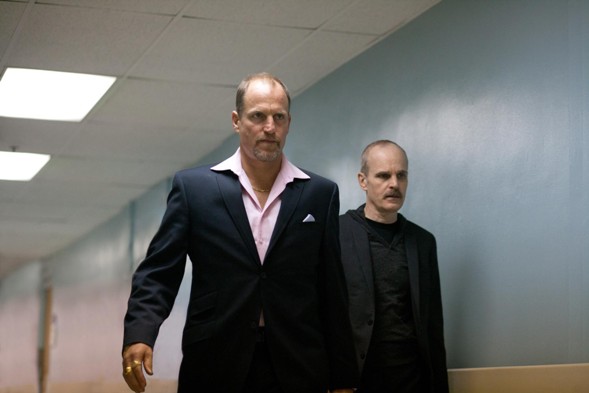
What comes to mind when thinking about the British contribution to international cinema? Costume dramas, perhaps? Mike Leigh? Smoothly spoken uber-criminals, Judy Dench? Maybe even improbably fluffy little dogs and psychopaths? But I’m getting ahead of myself. Allow me to explain.
Martin McDonagh is not your typical British transplant to Hollywood. True, his roots lie in theatre, the film-making business’s most efficient farm system. But this is author of The Lieutenant of Inishmore and The Pillowman that we’re talking about; it’s fair to assume that he didn’t head out West to work on Merchant-Ivory adaptations.
McDonagh is disconcertingly fluent in the language of casual violence, which fits neatly into Hollywood’s favoured demographic, popcorn-munching video-game addicted 18-35 year old males. (This writer considers himself an honorary member of this demographic.) However, confusingly, he also deals in humour; his violence, more often than not, is an ironic construct. The Brits know all about irony; American film-makers, I’d argue, do not.
So it’s not only impressive that Seven Psychopaths, his new film (which opened the 10th British Film Festival last Thursday) got made in the first place, but also that it synthesises Hollywood and Pinewood quite well. Messily well, to be precise, but messy in a good way.
Martin is an Irish screenwriter in LA, struggling to come up with the script that meets the potential of its title, Seven Psychopaths. (Yes, this is very meta- at this point. But bear with it.) His mate Billy needs a sideline to make ends meet, like most jobbing actors in LA. Billy is an inventive fellow, however: rather than waiting tables or male go-go dancing, he kidnaps dogs for a living, returning them for a ransom. However, this ingenious little earner goes horribly wrong after Billy and partner Hans – gentle, softly spoken, unthreateningly unkempt – make the mistake of abducting the prized Shih Tzu of Charlie, a decidedly unfriendly hoodlum.
Part of the fun of Seven Psychopaths lies in wilfully over-the-top plot development. Billy has a soft spot for Martin, despite actions and utterances to the contrary; he tries to help his stuck friend out by taking out an advert inviting retired psychopaths to swap stories with the screenwriter. But when this ingenious initiative fails to yield fruit, he takes matters into his own arms, helped along by Charlie’s vengeful quest for revenge and redemption. (Yes, the dog does mean that much to him.)
But returning to the meta-narrative, much of the pleasure – if one might be so bold as to describe a film as violent, and as violently funny thus – of Seven Psychopaths derives from the sharp and witty script, coupled with on-the-mark acting. Colin Farrell plays to his strengths as the screenwriter sucked into intrigue and ultra-violence against his will; Sam Rockwell brings a deranged energy to Billy, who is somewhat more – or less, depending upon your perspective – than the sum of his parts. Christopher Walken, once the go-to guy for psychopaths and creeps, is astonishingly effective as the oasis of relative sanity amidst the madness of dog-napping and psychopath-ery. As for Woody Harrelson, as Charlie…well, let’s just say that Mr Harrelson has worked very hard over the years to distance himself from the goofy Woody of Cheers, and in Charlie has quite possible found the aphelion of the role that made his name.
Seven Psychopaths lacks the restraint of In Bruges, McDonagh’s Oscar-nominated previous writer-director gig, and given the merciless digs it makes at the expense of the Hollywood system is unlikely to match its success. But it is a very funny, very wrong film, quite possibly of the sort that only a Brit can get away with making on a large scale in Hollywood, the La-La land with its sense of humour surgically removed.

Sightseers, on the other hand, is unlikely to attract as much attention as Seven Psychopaths, which is a bit of a shame. It’s nothing to do with the film, directed by Ben Wheatley and starring Steve Oram and Alice Lowe, who both star: it’s more the fact that it embraces – then subverts – some distinctly British sensibilities so thoroughly that it is hard to imagine it finding a home out West.
Chris is taking new girlfriend Tina on a caravan trip around the Lake District and Pennines in northern England. It’s picturesque landscape, but this is England, so we never quite get to see it that way. Betwixt the rain and Chris’s rather inspired itinerary – The Keswick Pencil Museum, anyone? The Crich Tram Museum? No, I thought not – we end up spending more time with Chris and Tina than is necessarily healthy.
Tina, a trained dog psychologist (!) is glad to get away from her stifling, suffocating, hypochondriac mother, unforgiving since said daughter conspires to accidentally kill their beloved terrier dog with her knitting needles. Chris, who was once something in plastics, says he’s taking off time work to write a book, and wants Tina to be his muse. Tina is new to the musing game – this is no surprise, by the way – but is delighted to oblige.
Chris’s eerie bonhomie soon turns to plain eeriness, and a clash with a litter lout leads to rather drastic public order enforcement. We soon understand that all sorts of things arouse his ire: middle class caravaners, graffiti, public school-educated hikers…Tina, for her part, loses her innocence but finds a replacement for Poppy. That aside, Chris is a path out of her dreary suburban twilight, and she’ll do anything – literally anything – to stay in his good books.
Homicide as a means of resolving interpersonal disputes is never to be recommended, even if there is a silver lining waiting to be uncovered. (Chris: “Think of the reduction in carbon emissions…” Tina: “Killing is green!”) Their literal-mindedness tempts one to think of them as simple, but this rather misses the point. Chris says, deadpan serious, that “he wants to be feared and respected.” Sightseers, once one looks beyond the quasi-comic psychopathic tendencies of its principals, has a rather serious point to make about the disenfranchisement of middle England, and the anger that this creates. Of course, the British don’t emote terribly well; the perverse black humour of Sightseers, fluffy dogs, random murders and all, serves as the perfect foil for some deadly serious points.
Seven Psychopaths and Sightseers were screened in the context of the British Film Festival. The festival films will be screened at cinematheques through February 10th, the full schedule and additional information may be found on the festival website.





